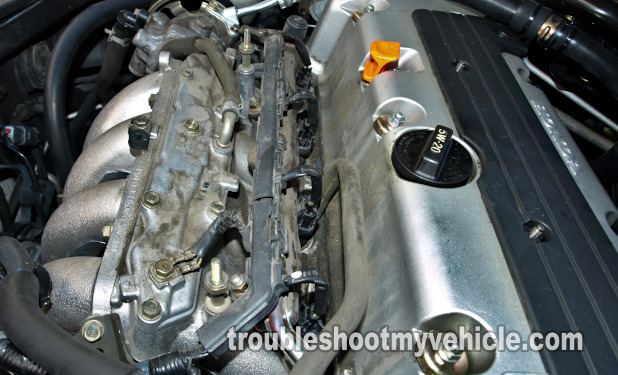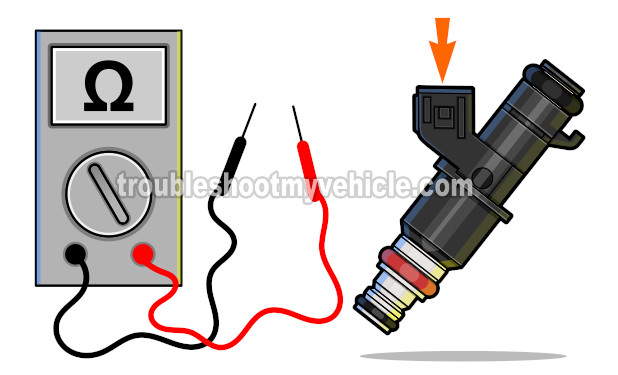
Testing the fuel injectors on your Honda Accord, CRV or Element with a 2.4L four cylinder engine is pretty easy. In this tutorial I'll show you how to resistance test them with your multimeter.
Since it's rare for fuel injectors to go bad, and you might be in need of some helpful diagnostic advice. I'll also offer a simple diagnostic strategy that will help you to nail down the misfire or rough idle condition your Honda is experiencing.
Contents of this tutorial:
ES ![]() You can find this tutorial in Spanish here: Cómo Probar Los Inyectores (2003-2006 2.4L Honda Accord) (at: autotecnico-online.com).
You can find this tutorial in Spanish here: Cómo Probar Los Inyectores (2003-2006 2.4L Honda Accord) (at: autotecnico-online.com).
WIRING DIAGRAM: The following wiring diagram may come in handy:
- Fuel Injector Circuit Diagram (2003-2005 2.4L Honda Accord).
- Fuel Injector Circuit Diagram (2006-2007 2.4L Honda Accord).
ENGINE CYLINDER MISFIRE DIAGNOSTICS:
Symptoms Of A Bad Fuel Injector
As you're already aware, your Honda's 2.4L engine has four cylinders. Each cylinder needs 3 specific things to keep your engine running happily and these are fuel, spark, and air.
So, when one engine's cylinder's fuel injector stops injecting fuel, that specific cylinder will go 'dead'. When this happens, your 2.4L Honda vehicle will experience one or several of the following:
- Engine will have a rough idle.
- Engine will misfire under load, especially when you accelerate your Honda Accord (CRV, Element, etc).
- Lack of power when accelerating your Honda.
- Bad gas mileage.
- Since your 2.4L Honda vehicle is OBD II equipped, you'll usually see a Misfire Code (P0300, P0301, P0302, P0303, P0304) lighting up the check engine light on your instrument cluster.
So, what causes a fuel injector to go bad? It's usually just old age. Although not always. Which leads up to the 3 main types fuel injector failure:
- Fuel injector doesn't spray any fuel because it has fried internally.
- Fuel injector sprays fuel, but not enough (clogged fuel injector).
- Fuel injector stuck On all of the time (as soon as the key is turned On). This is usually, but not always due to a bad fuel injection computer.
This article focuses on the most common, which is when the fuel injector doesn't spray any fuel at all due to an internal short circuit.
What Tools Do I Need To Test The Fuel Injectors?
To test the fuel injectors in your 2.4L Honda Accord (CRV, Element) you don't need any expensive tools.
Here's a basic list of tools you'll need to test all four fuel injectors:
- A multimeter.
- You'll only be using the multimeter to check resistance (Ohms).
- If you need to upgrade or buy a multimeter, check out my recommendation: Buying A Digital Multimeter For Automotive Diagnostic Testing (found at: easyautodiagnostics.com).
- Scan tool.
- To actually test the fuel injectors, you don't need a scan tool (since a scan tool can't dynamically test the fuel injectors). But, having one makes the whole process easier since you're able to retrieve any diagnostic trouble codes (DTCs) stored in the PCM memory.
- Don't have one? Check out my recommendation: Abe's Scan Tool Recommendation.
- Pen and paper to write down your fuel injector resistance test results.
Where To Buy The Fuel Injector And Save
The following fuel injectors are of known automotive brands that I use and buy myself:
Disclosure: As an Amazon Associate, I earn from qualifying purchases. If my tutorials help you, using these links is an easy way to support the site at no extra cost to you. Thank you!
NOTE: Not sure if the fuel injector fits your particular vehicle? Don't worry. Once you get to the site, they'll ask you for the specific of your Honda. If the fuel injector doesn't fit, they'll find you the right one.
TEST 1: The Fuel Injector Test

As I mentioned at the beginning of this article, testing the fuel injectors is easy since all you're doing is a simple resistance test. Before we start, I want to give you a few pointers that will speed up your diagnostic.
First, and the most important one, is that even when the fuel injectors are good (working perfectly) they are not gonna' all have the exact same resistance value.
A small variation in their resistance values is normal. What IS NOT normal is when the resistance value of a fuel injector varies drastically compared to the others that you know that one is bad. Here's an example of this:
- Cyl #1 injector: 7.45 Ω
- Cyl #2 injector: 7.65 Ω
- Cyl #3 injector: 1.15 Ω < drastic difference indicates the injector is bad.
- Cyl #4 injector: 7.20 Ω
Second, to get the most accurate snapshot of the condition of the fuel injectors you're testing, the engine in your Honda vehicle has to be warmed up. The key word here is warm. If the engine is hot (normal operating temperature), let it cool down for about an 45 minutes to an hour.
Alright, here are the steps:
- 1
Disconnect all four injectors from their electrical connectors. Although you may want to just test one fuel injector, I recommend testing all four of them on your Honda Accord (or CRV or Element).
- 2
Turn on your multimeter and select Ohms mode and with the multimeter test leads, probe the male spade terminals of the first fuel injector you're gonna' test.
- 3
It doesn't matter what color test lead you use to test either of the two fuel injector male spade terminals, the polarity of the leads is not important when testing the resistance (Ohms) of the fuel injectors.
- 4
Write down this Ohms value down on a piece of paper after measuring the internal resistance of this first fuel injector. You'll be using this resistance value to compare it to the other three in a few moments.
Don't forget to write down to what engine cylinder this fuel injector belongs to. You can use the image in the photo viewer as an aid in identifying the cylinders. - 5
Test the remaining fuel injectors and as before, write down their ohms value (that your multimeter registered).
Alright, with the resistance values of all fuel injectors on paper, let's interpret your results. Choose from one of the following CASES:
CASE 1: All of the multimeter resistance values are nearly identical. This result indicates that the fuel injectors are OK. So if your car is experiencing a Rough Idle Condition or a Misfire Condition or Misfire Codes, the fuel injectors are not to blame.
Here's why: when you do find one bad fuel injector, this one will have a totally different Ohms (resistance) value. And this will confirm beyond any doubt that that fuel injector is bad.
Now, if your vehicle is till missing, take a look at the following two sections of this article:
CASE 2: One of the four multimeter resistance values is drastically different: this tells you that that particular fuel injector, on your Honda, with the drastically different resistance value is bad.
I suggest that you retest that fuel injector one more time to make sure of the Ohms (resistance) value. If this value is still the same as before, the fuel injector is bad.


